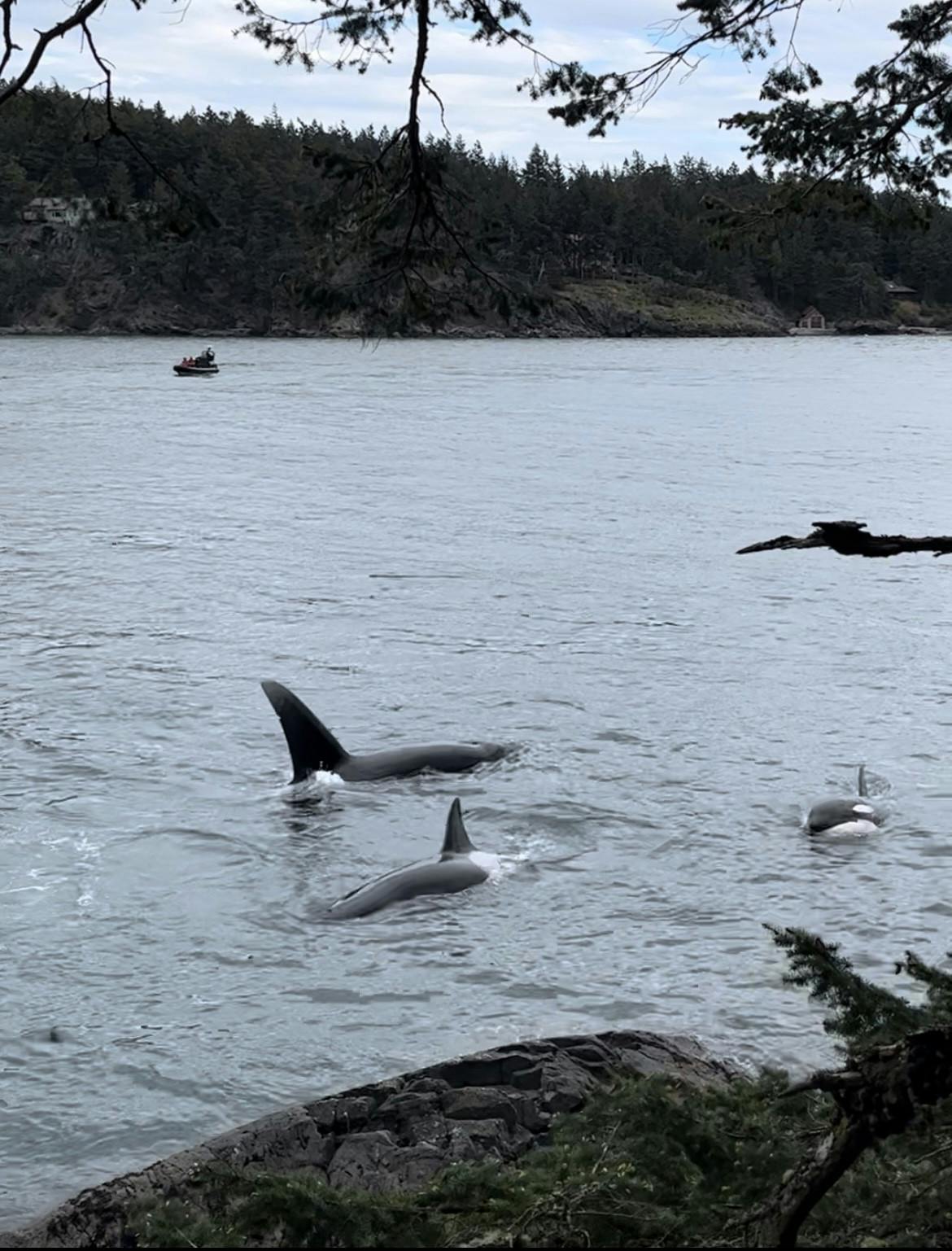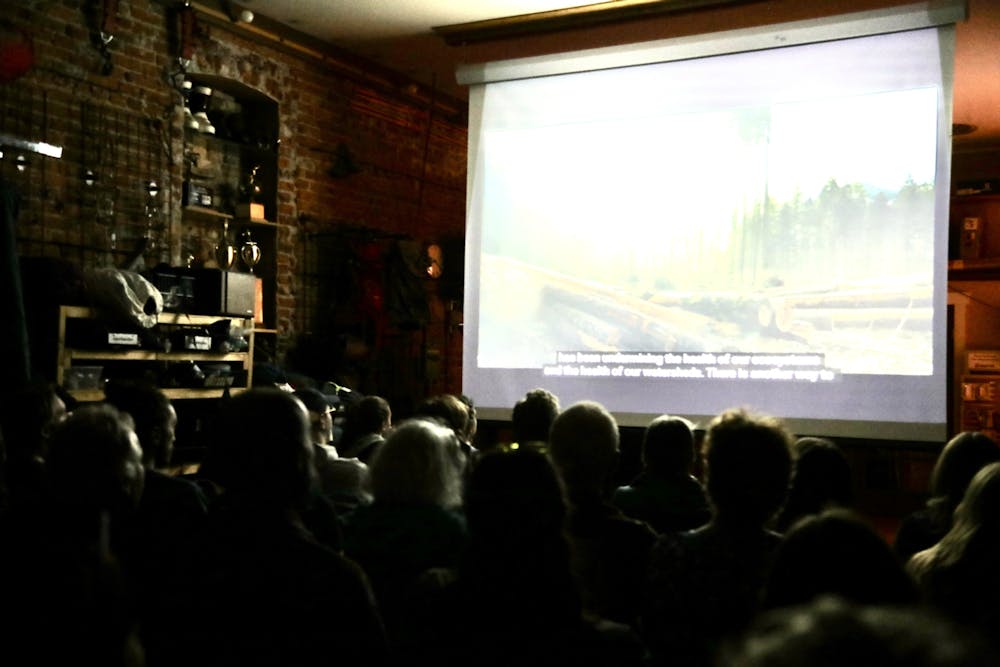On April 18, a film screening about the Pacific Northwest’s salmon, rivers and forests was held in Backcountry Essentials in downtown Bellingham. The event was co-hosted by Backcountry Essentials and Patagonia, where local environmental nonprofit organizations RE Sources and Nooksack Salmon Enhancement Association shared several ways Bellingham residents can take action on behalf of the local environment through advocacy and volunteering.
“I have not lived here for long, but I am so drawn to the beauty of this area,” said Maureen Kosa, an attendee. “I came to this event because these two organizations are doing a great job in environmental restoration.”
Why do salmon matter?
Salmon are not just an iconic symbol of the Pacific Northwest. They are vital in many aspects.
“Salmon are a keystone species in the environment, are central to the culture of Coast Salish People like the Lummi Nation, the Nooksack Indian Tribe, and many others, and are important as a food source and to the economy of this region,” said Nathan Zabel, an education program manager of NSEA, in an email.
A keystone species is an organism that helps define an entire ecosystem. In the Pacific Northwest, the health and stability of ecosystems hinge entirely upon salmon. They support populations of birds, and both land and marine mammals such as bears, orcas and seals by providing them with nutrients essential for their survival.
Two Native American tribes near Bellingham identify themselves as “salmon people.”
According to the Lummi Nation Natural Resources website, “Salmon play an important role in the lives of the Lummi people; ceremonial practices, subsistence, and economic well-being of tribal members.”
Also, for the Nooksack Indian Tribe, “Salmon are our heritage and our culture, and today we work to ensure that our children, grandchildren and future generations have salmon.” said the website Salmon Need Water.
However, according to the 2022 State of Salmon report, “14 population groups of steelhead and Chinook, coho, chum and sockeye salmon in Washington State are listed as threatened or endangered under the Endangered Species Act.”
The report also mentions the variety of threats that salmon face now, including warming waters caused by climate change, streams drying up, vanishing floodplains, polluted water and a gauntlet of predators.

Farmed salmon threaten wild salmon
Salmon farms are a threat to wild salmon, said Alexander Harris, land and water policy manager for RE Sources, and Rachel Vasak, executive manager of NSEA.
Critics say top concerns about farmed salmon include the potential of salmon farms being a vast source of diseases, parasitic sea lice and bacteria that devastate wild populations, and contamination of the environment.
However, salmon farming in Washington is coming to an end. In 2022, Commissioner of Public Lands Hilary Franz announced an executive order to prohibit commercial finfish net pen aquaculture on state-owned aquatic lands. This decision follows California, Oregon and Alaska.
Healthy forests and salmon preservation
The health of forests might seem irrelevant to salmon preservation at first glance. However, a video by RE Sources explains that forests play a vital role by restoring a large amount of water and enabling a stable river supply while regulating both winter flooding and summer drought. Without a stable water supply, salmon lose their home to come back and spawn.
To protect forests, RE Sources launched the Future Forests Campaign, which is a science-based, grassroots effort to transition from industrial logging practices to ecological forest management in critical parts of the Lake Whatcom and Nooksack River watersheds.
Industrial logging practices often include clear-cut logging, which has devastating environmental costs.
“Clearcutting causes erosion, landslides and contamination of our water supply with sediment and the toxic herbicides used in the clearcutting process,” according to the Sierra Club website. “Clearcutting also compacts the ground and decreases the soil’s ability to retain water, ultimately reducing our supply of clean water.”
Harris said it is done as an incentive to maximize short-term revenue; trees are cut around the age of 35 to 45.
One of the ways to transition from these practices to ecological forest management is to introduce longer harvest rotations, Harris said. Forests in the Northwest do not hit their stride until they are 50 or 60. By the time they are 70, they grow at their most rapid rate. As a result, harvesting trees at 80 years, instead of 40, stores more carbon and yields more timber.
However, Harris said it’s difficult to incentivize forestry workers to introduce longer harvest rotations.
“Average human lifetime is 75 or 80 years. If you plant a forest and have to wait 80 years to harvest it, you will be dead by the time it is ready to be harvested,” Harris said. “So, it's just inherently hard for humans to wait that long.”
There are a handful of different strategies, and there's not a sole optimal strategy to incentivize people for long rotation, Harris said. His personal favorite and most interesting way to incentivize is carbon credits.
According to Harris, carbon credits aim to tackle climate change by financially incentivizing actions that reduce carbon emissions or remove existing carbon from the atmosphere.
Forest landowners can earn money by implementing practices, such as long rotations, that store additional carbon, thereby contributing to the fight against climate change and benefiting financially.
“They usually care about being compensated for making those kinds of sacrifices, and the carbon market is increasingly becoming a tool to incentivize those kinds of forest practices,” Harris said.
The Climate Commitment Act is threatened
Harris emphasized the significance of the general public's recognition of threats towards the Climate Commitment Act.
The Climate Commitment Act was passed by the state Legislature in 2021. The act taxes carbon emissions from the 100 largest identified polluters. With all the money the state of Washington gets, they invest it in what Harris says is “innovative and very cool climate action.”
Harris said that not everyone is in favor of this legislation.
“A lot of different interests are adversely impacted by the taxing of carbon,” Harris said. “Some wealthy individuals are funding a ballot initiative that will if passed, get rid of the Climate Commitment Act; it will completely cancel this policy.”
Additionally, Harris referred to state Initiative 2117, which goes before voters on Nov. 5, 2024. Its passage would repeal the Climate Commitment Act, which Harris called the most important environmental policy in a generation.

Small things everyone can do to help salmon
Supporting fishermen who practice sustainable wild salmon fishery is one of the ways people can help preserve salmon, Harris said. Reef net fishing is known as the region’s most sustainable way of fishing.
According to the website above, this fishing method was invented by the Lummi Nation and other Coast Salish Native Americans over 1,000 years ago.
Buying sustainable products at the local supermarket and Bellingham Dockside Market, which is held on the first and third Saturday of every month, is one way to support those sustainability-oriented fishermen.
There are many small steps anyone can take to help salmon, Vasak and Zabel said. These include properly disposing of trash, recycling, using less water, reducing carbon footprints, turning off the lights when you leave the room, using a car wash that doesn't pollute and even teaching others about salmon.
“My belief is that everybody could do something that would help salmon a little bit, and by helping salmon, we're helping the environment and ourselves too,” Vasak said.
Ikumi Mashiko (she/her) is a city news reporter this quarter at The Front. She is a junior exchange student from Japan. She enjoys swimming in open water, skiing and cooking. You can reach out to her at ikumi.thefront@gmail.com.






